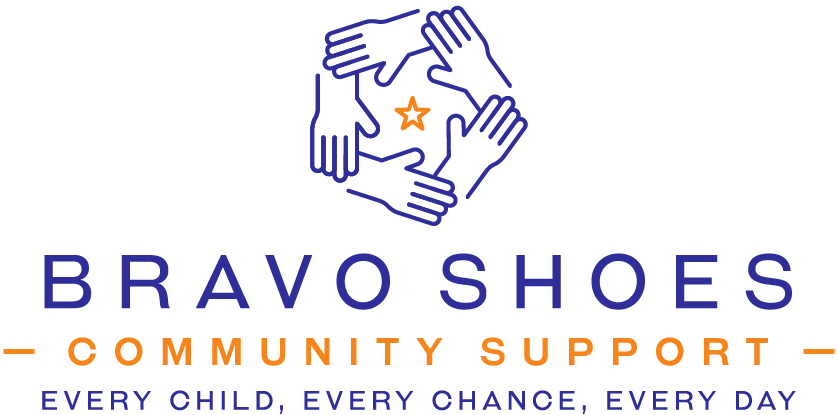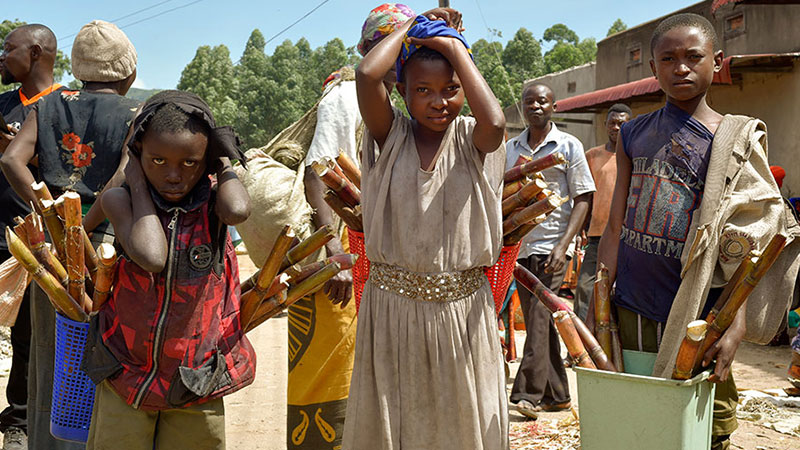June 18th is the Day of the African Child (DAC). It is a day to promote children’s rights and take stock of the efforts being made to protect and promote them across the continent.
When Bravo Shoes Community Support Organisation visited Kasese recently, we discovered that some of the school-going children aged 15 and 16 are not certain of what the future holds for them. The children we spoke to, expressed fear and diminishing chances of staying in school.
In the same community, there are girls of the above age breastfeeding while pregnant while others below that age hawk merchandise like sugarcanes and boiled eggs within the town.
Biira Evelyn is a 13-years-old student of Quality Model School, she wakes up as early as 6:00 Am to fetch water from the nearby borehole a few kilometers away, according to Biira, she goes to the borehole at 6:00 Am and returns home at 8:00 Am with her jerry can be stacked with a cloth on her forehead before she goes to school. It may take her another 1 hour to reach school.
“It is easier to climb with a jerry can on the head than using bare hands, you easily get tired with your hands,” she said referring to the mountains that can’t allow them to use their hands much often within their location.
It is estimated that Bakonzo women carry loads between 30kgs to 35kgs on their foreheads and move several kilometers as they hawk merchandise to earn a living.
Then Biira Naome, a 15-year-old Primary six student at Nyabugando Primary School has a similar experience, it takes hours for her to reach school which is kilometers away from home.
“Most of my friends are married off because our mothers cannot afford to raise school fees,” she narrates.
In 2016, Gertrude Muhindo was 16 years old while living with her single mother in the village in Mukunyu sub-county, Kasese District.
Her story is appalling on how she started life, she met this young ‘Samaritan’ man who offered to give her some job in exchange for sh1,000 that could buy one 48 paged exercise book at the time.
Unaware of his hidden motive, Muhindo accepted to go and work for him at his house and in the process he defiled her.
Not sure of the consequences and also afraid of what the community/school would say, Muhindo kept the news to herself and moved back to school with one exercise book. Along the way, she discovered she was pregnant but still could not trust anybody with the news and therefore kept it to herself until she couldn’t hide anymore.
In the third term, she was forced to drop out of school, and with the help of her mother and the head teacher; she reported the case to the police but the culprit had already fled the village.
The case was brought to the attention of the Inspector of School and Senior Probation and Social Welfare Officer – Kasese District local government but they could not do much since the culprit is at large.
They however encouraged Muhindo to continue with her education and the school allowed her to study from home but maintained her on their candidate list. She was then called to sit for the Primary Living Examination (PLE) in November 2016.
It was during her third paper on the second day of examination that she went into labor, fortunately for her, the school rushed her to Kilembe hospital where she gave birth to a baby boy whom she named Baby Elijah.
She completed the English paper on her labor bed and was later taken back to school to sit for the last examination paper (Social Studies) at 2:00 pm that same afternoon.
Muhindo passed her PLE with 27 Aggregates, 3rd division, and qualified for secondary school admission. She has admitted to the secondary school where she put her first choice but could not join the school because her mother could not afford the fees and related requirements and also because she needed to stay home and nurse her baby.
She joined another secondary school, as a day student.
She faced challenges in meeting her educational requirements, providing for her nine months old baby, and their daily basic domestic requirements.
They sometimes go for a day or two without any meal.
Muhindo worries that she may fail to continue with her education if her situation does not improve. Her baby is surviving through support from people that come her way.
Not only Muhindo or children in Kasese, but the number of children involved in child labor has also gone up for the first time in two decades – and Africa has the highest number of children affected. Child Marriage rates are threatening to increase globally and in the region, and practices such as Female Genital Mutilation.
Child marriage is a global practice and a manifestation of deeply rooted gender inequalities that impact the development, well-being, and life options of girls, their families, and communities at large.
In 2014, the African Union (AU) commissioned a campaign to end child, early and forced marriage in one generation. This campaign opened space for a conversation on child marriage among African leaders, resulting in the adoption of an African Common Position on Child marriage. The campaign also succeeded in putting child marriage on the development agenda of many AU member states, most of which had previously not developed a national response to child marriage.
How the Day of the African Child started
On 16 June 1976 In Soweto, South Africa, thousands of black schoolchildren took to the streets to protest about the inferior quality of their education and to demand their right to be taught in their own language. Hundreds of them were shot down; and in the two weeks of protest that followed, more than a hundred people were killed and more than a thousand injured. To honor their courage and in memory of those killed, in 1991 the Organisation of African Unity (now the African Union) established the Day of the African Child.

